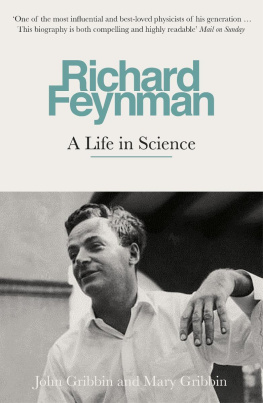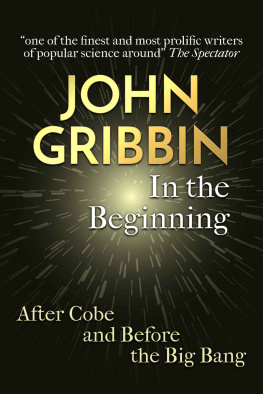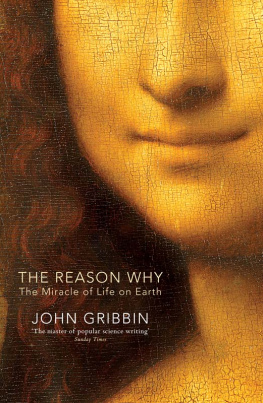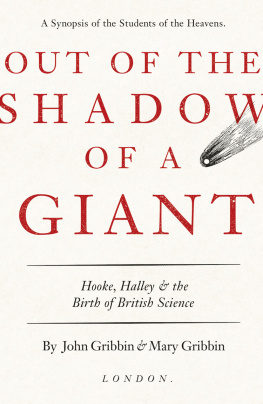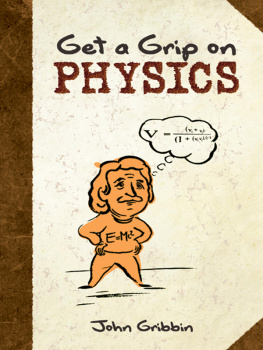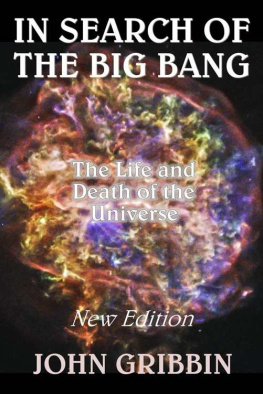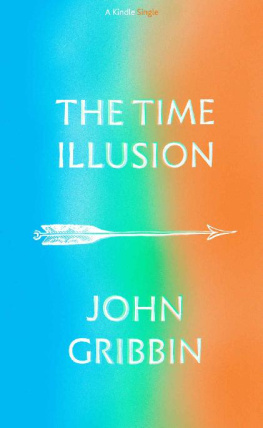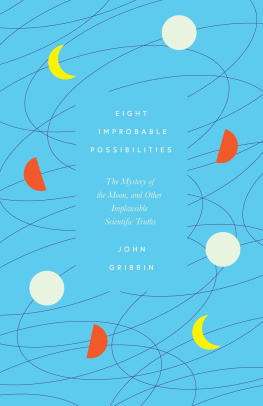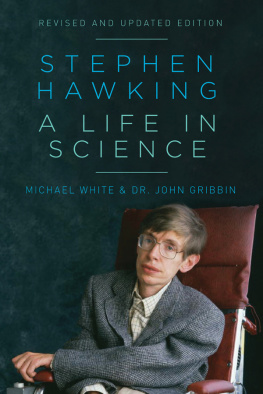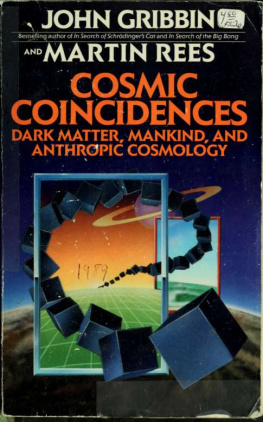John Gribbin - The Universe: A Biography
Here you can read online John Gribbin - The Universe: A Biography full text of the book (entire story) in english for free. Download pdf and epub, get meaning, cover and reviews about this ebook. year: 2007, publisher: Allen Lane, genre: Art. Description of the work, (preface) as well as reviews are available. Best literature library LitArk.com created for fans of good reading and offers a wide selection of genres:
Romance novel
Science fiction
Adventure
Detective
Science
History
Home and family
Prose
Art
Politics
Computer
Non-fiction
Religion
Business
Children
Humor
Choose a favorite category and find really read worthwhile books. Enjoy immersion in the world of imagination, feel the emotions of the characters or learn something new for yourself, make an fascinating discovery.

- Book:The Universe: A Biography
- Author:
- Publisher:Allen Lane
- Genre:
- Year:2007
- Rating:5 / 5
- Favourites:Add to favourites
- Your mark:
- 100
- 1
- 2
- 3
- 4
- 5
The Universe: A Biography: summary, description and annotation
We offer to read an annotation, description, summary or preface (depends on what the author of the book "The Universe: A Biography" wrote himself). If you haven't found the necessary information about the book — write in the comments, we will try to find it.
The Universe: A Biography — read online for free the complete book (whole text) full work
Below is the text of the book, divided by pages. System saving the place of the last page read, allows you to conveniently read the book "The Universe: A Biography" online for free, without having to search again every time where you left off. Put a bookmark, and you can go to the page where you finished reading at any time.
Font size:
Interval:
Bookmark:
The Universe
JOHN GRIBBIN
A Biography
ALLEN LANE
an imprint of
PENGUIN BOOKS
ALLEN LANE
Published by the Penguin Group
Penguin Books Ltd, 80 Strand, London WC2R 0RL, England
Penguin Group (USA) Inc., 375 Hudson Street, New York, New York 10014, USA
Penguin Group (Canada), 90 Eglinton Avenue East, Suite 700, Toronto, Ontario, Canada M4P 2Y3
(a division of Pearson Penguin Canada Inc.)
Penguin Ireland, 25 St Stephens Green, Dublin 2, Ireland
(a division of Penguin Books Ltd)
Penguin Group (Australia), 250 Camberwell Road, Camberwell, Victoria 3124, Australia
(a division of Pearson Australia Group Pty Ltd)
Penguin Books India Pvt Ltd, 11 Community Centre, Panchsheel Park, New Delhi 110 017, India
Penguin Group (NZ), 67 Apollo Drive, Mairangi Bay, Auckland 1310, New Zealand
(a division of Pearson New Zealand Ltd)
Penguin Books (South Africa) (Pty)Ltd, 24 Sturdee Avenue, Rosebank, Johannesburg 2196, South Africa
Penguin Books Ltd, Registered Offices: 80 Strand, London WC2R 0RL, England
www.penguin.com
First published in the USA, under the title The Origins of the Future,
by Yale University Press 2006
First published in Great Britain by Allen Lane 2007
1
Copyright John and Mary Gribbin, 2006
The moral right of the author has been asserted
All rights reserved. Without limiting the rights under copyright
reserved above, no part of this publication may be reproduced, stored in
or introduced into a retrieval system, or transmitted, in any form or by
any means (electronic, mechanical, photocopying, recording or otherwise)
without the prior written permission of both the copyright owner
and the above publisher of this book
A CIP catalogue record for this book is available from the British Library
EISBN: 9780141902777
For Ben and Ellie
It is not what the man of science believes that distinguishes him, but how and why he believes it. His beliefs are tentative, not dogmatic; they are based on evidence, not on authority or intuition.
Bertrand Russell (18721970)
Most of the research for my recent books has involved delving in dusty archives and reading secondhand (at best)reports about the lives and work of dead people. Intriguing though this has been, it has made a pleasant change, in working on the present book, to be talking to living people about their own work. But because my aim here is to give an overview of what is going on in the physical sciences today, I have seldom referred to individuals or individual pieces of research by name in the main text. If there is one thing I have learned from writing my more historical books, it is that science is a communal activity in which the whole is greater than the sum of its parts. The we that appears in the text refers to the whole pool of scientists, past and present, who have contributed to our understanding of the physical Universe. But I could not have written this book without discussions and correspondence with many individual researchers, both specifically for this book and on other occasions over the years, and would like to thank Kevork Abazajian, John Bahcall, John Barrow, Frank Close, Ed Copeland, Pier-Stefano Corasiniti, John Faulkner, Ignacio Ferreras, Simon Goodwin, Ann Green, Alan Guth, Martin Hendry, Mark Hindmarsh, Gilbert Holder, Isobel Hook, Jim Hough, Steve King, Chris Ladroue, Ofer Lahav, Andrew Liddle, Andrei Linde, Jim Lovelock, Gabriella De Lucia, Mike MacIntyre, Ilia Musco, Jayant Narlikar, Martin Rees, Leszek Rozkowski, B. Sathyaprakash, Richard Savage, Peter Schrder, Uros Seljak, Lee Smolin, Adam Stanford, Paul Steinhardt, Christine Sutton, Peter Thomas, Kip Thorne, Ed Tryon, Neil Turok and Ian Waddington for their generous willingness to share their ideas with me. Going back even farther, I owe an unrepayable debt to several scientists who are no longer with us; in the order in which they exerted their influence on me, these were Bill McCrea, Fred Hoyle, Willy Fowler, Roger Tayler and John Maynard-Smith.
Thanks also to Christine and David Glasson, who were responsible for making me take occasional breaks from the work; to the Alfred C. Munger Foundation, which again made a generous contribution to my travel and other research expenses; to David Pearson, for his visual insight; and to the University of Sussex, which provided a base from which to work.
As always, though, the greatest behind-the-scenes contribution came from my ever-present, but not always visible, collaborator, Mary Gribbin.
Why a Biography?
When I started writing books about science, more than thirty years ago, it seemed to me that I was dealing with clear-cut facts, things like Newtons laws, the way continents move about the surface of the Earth, how stars release energy through the process of nuclear fusion operating deep in their hearts, and so on. Later, as I increasingly turned my attention to the history of science and biography, I became intrigued by the way in which such investigations are necessarily to some extent subjective and open to interpretation. It is impossible to write the history of science (or of anything else), because we do not have all the facts; we have to fill in the gaps with guesswork, even if it is educated guesswork making full use of all the facts we do have. Similarly, it is impossible to write the life story of a human being (even one who is still alive), because of the fallibility of human memory and the incompleteness of the records. Rather late in the day, I came to realize that the same limitations apply to any attempt to write a history, or life story, of the Universe. Although we know a remarkable amount about the way the Universe has developed since the Big Bang, in some cases to an exquisite precision, there will always be gaps in that knowledge, where we have to use educated guesswork to work out what happened. So there can never be a single, definitive history or biography of the Universe; only different, more or less subjective, interpretations of the story.
This suggested the intriguing possibility of writing an account of the origin, evolution and possible fate of the Universe using the approach that I would use if writing a biography. Ask the basic questions about the subject, and answer them as best I could, filling in the gaps where necessary with educated guesswork. How did the Universe begin? Where do the material particles we are made of come from? Where do galaxies come from? How do stars and planets form? How did life begin? We have only provisional answers to those questions (some more provisional than others) but they are answers which are all likely to be improved dramatically by scientific progress over the next ten years. The provisional answers we already have are vastly better than no answers at all, and the story of how we arrived at those answers is one worth telling in its own right, as well as setting the scene for the stories likely to make headline news over the next decade.
When I wrote my history of science since the sixteenth century, I used a different kind of biographical approach, concentrating on the lives and achievements of individual scientists. Initially, I intended to use the same biographical approach here, hoping to give insight into the way science works today by focusing on individual contributions. But they do science differently these days. The more I travelled on visits to scientists active today the more I realized just how much things have changed, even in my own lifetime. Individual scientists in the physical sciences today generally focus on relatively small problems while working in rather large teams, so that it is often difficult to identify the specific contribution of an individual, or to claim that the project would not have succeeded so well if someone else had been doing their job. Yet the whole has become greater than the sum of its parts, so that a compelling, consistent and very nearly complete picture of how the physical world works, and how the Universe we see around us got to be the way it is, has emerged. One of the most fascinating features of this story is that the mystery of the origin of life now falls squarely within the province of physical science (and is considerably less mysterious than it used to be).
Next pageFont size:
Interval:
Bookmark:
Similar books «The Universe: A Biography»
Look at similar books to The Universe: A Biography. We have selected literature similar in name and meaning in the hope of providing readers with more options to find new, interesting, not yet read works.
Discussion, reviews of the book The Universe: A Biography and just readers' own opinions. Leave your comments, write what you think about the work, its meaning or the main characters. Specify what exactly you liked and what you didn't like, and why you think so.

